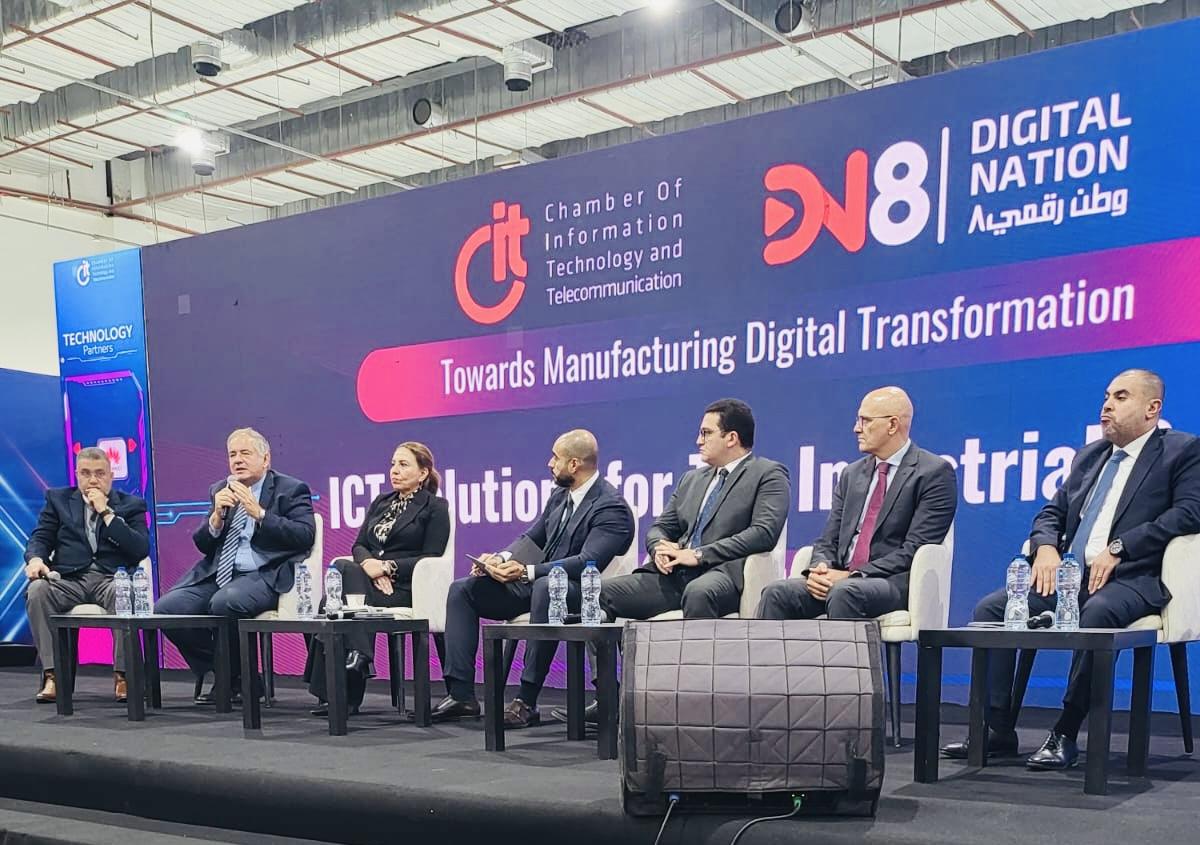Ghada Labib: Egypt is working to localize innovation by establishing 23 digital creativity centers in 19 governorates
Khaled Ibrahim: We are working to coordinate efforts with the Ministry of Communications to enhance the contribution of technology companies to the digital economy
By: Bakinam Khaled
Engineer Ghada Labib, Deputy Minister of Communications and Information Technology for Institutional Development, confirmed that Egypt is working to enhance innovation by establishing 23 digital creativity centers in 19 governorates, meaning that more than one creativity center can be available in one governorate in addition to the University of Egypt for Informatics in the Administrative Capital New.
This came during the opening session of the 8th session of the " DIGITAL NATION 8" conference, which is currently being held under the title: "Towards a Digital Industrial Renaissance", with the participation of 40 technology companies showcasing smart manufacturing solutions that coincided with the annual international industry forum and exhibition, moderated by Dr. Khaled Abdel Azim, Executive Director of the Federation of Egyptian Industries, which includes Eng. Khaled Ibrahim, Head of the Information and Communications Technology Chamber at the Federation of Industries "CIT", Eng. Mohamed El-Zomor, Regional Sales Manager for Storage Platform Solutions for the Middle East, Turkey and Africa at Dell Technologies, Ahmed Alaa, Regional Manager at Trend Micro, Eng. Mahmoud Safrata, Director of the Market Development Sector at the Information Technology Industry Development Agency "ITIDA", and Eng. Mohamed Gamal, Vice President of the Engineering Industries Chamber at the Federation of Industries.
Innovative Applications of Artificial Intelligence
Eng. Ghada explained that we are reviewing some models of artificial intelligence projects implemented by the ministry in cooperation with various sectors, including innovative applications for early detection of diseases such as breast cancer, glaucoma and diabetic retinopathy with an accuracy exceeding 90%. The state spares no effort in creating a legislative environment that stimulates investment by issuing laws such as personal data protection and combating cybercrime.
She pointed out that there must be a partnership between the government, the private sector and civil society to achieve the goals of digital transformation through cooperation between all parties of the system; guided by the initiatives that were recently launched such as the "Digitization of Factories" initiative, the "Electronic Catalog" platform, and technology employment programs, which primarily enhance support for the digital industry and promote comprehensive development in Egypt.
She added that Egypt has occupied advanced positions in the field of entrepreneurship, as it has become among the top three countries in the Middle East and North Africa region in this field, and there are more than 600 emerging companies that now rely on technology in their activities. The state has pumped investments of more than 150 billion pounds so far; to improve the efficiency of fixed internet and establish a fiber optic cable network, with 25 thousand government buildings connected digitally. The Deputy Minister of Communications said that most Egyptian villages have witnessed developments, most notably the "Decent Life" initiative, as the ministry focuses on providing internet access to more than 4,500 villages, while raising the efficiency of towers and communications services to reach more than 3 million new citizens in the coming period. Egypt has witnessed remarkable progress in global indicators related to digital transformation, as it has risen by about 49 places in the government's readiness index for artificial intelligence through the General Authority for Artificial Intelligence, and the state has achieved first place in Africa in digital infrastructure readiness.
Sponsoring creativity and technological investment
The Egypt Digital Strategy launched by the state in 2018 was based on three main axes: digital transformation, which is integrating technology into all sectors of the state, then building the human being digitally by qualifying young cadres to enter the digital economy, and finally sponsoring creativity and technological investment by encouraging entrepreneurship and supporting start-ups.
Ghada Labib said that the strategy depends on enhancing the contribution of the communications sector to the national economy, and attracting cash flows to achieve a qualitative shift in digital services provided to all citizens. The communications and information technology sector is the most dynamic and influential in all sectors of the local economy, and technology has become a key axis for achieving sustainable development goals during the current period. The communications and information technology sector recorded record growth rates exceeding 16% for the fifth consecutive year, and its contribution to the gross domestic product increased from 3.2% in 2014 to 5.8% this year, and Egypt topped the African continent in fixed internet speed with an average of 76.4 Mbps.
I hold the position of a member of the board of directors of an investment company wholly owned by the Egyptian Post in partnership with iFinance to create a platform that brings together manufacturers in one place to display and market their products effectively. The ministry cooperated through the Egyptian Telecom Company with a cooperation protocol with the Egyptian Post on the "Hikaytna" platform that affects the citizen and includes services and e-commerce, even if it is a "freelancer" to introduce himself and help him spread effectively.
3 Initiatives
For his part, Eng. Khaled Ibrahim, Chairman of the Chamber of Information and Communications Technology (CIT), said that 3 digital initiatives were launched through the activities of the " DIGITAL NATION 8 " conference, including "Digitizing Egyptian Factories in Partnership with the Federation of Egyptian Industries", which aims to stimulate the adoption of smart manufacturing technology to achieve digital transformation at the level of all industrial sectors to increase competitiveness among them. The 2024 Employment Forum for Technology Cadres will also be organized in partnership between the Chamber, the Federation of Industries and "Forasna" Company to highlight the possession of digital skills.
He added that the exhibition creates a link between small and medium technology companies that play a pivotal role in supporting economic development by providing innovative solutions that rely on human competencies and between all sectors that rely primarily on technology in their activities.
He explained the goal of the activities of the " DIGITAL NATION 8" conference and exhibition and the annual international forum and exhibition for industry, the integration of information technology and industrial sectors and bridging the gap between them through the exhibition activities. The forum has an important role in enhancing the role of youth by raising employment levels as a strategic goal and an essential part of the chamber's work program to implement the capacity development axis, in line with Egypt's Vision 2030 for sustainable development.
He pointed out that it is necessary to provide decent and productive job opportunities for youth that contribute to reducing the unemployment rate, doubling productivity, improving the standard of living and providing suitable job opportunities for technological cadres through the meeting point with industrial institutions participating in this forum. The chamber worked on the participation of 40 companies to provide services to the industrial sector and provide solutions for them to develop devices and rely on information technology. After conducting a survey, it became clear that 85% of factories do not rely on technology and digital solutions in their activity, so it is necessary to cooperate between all parties to increase awareness of the importance of using technology in industries to come up with products capable of exporting during the coming period.
Skills Development
On the other hand, Mohamed El-Zomor, Regional Sales Manager for Storage Platform Solutions for the Middle East, Turkey and Africa at "Dell Technologies", said that the company has been around since 2009 and is not a newcomer, and we have worked on developing skills and are working on exporting skills outside Egypt. The industry relies on technology in many fields.
Converting data into valuable information that can be analyzed to make sound decisions has become easier with the introduction of artificial intelligence, but it requires a strong infrastructure that keeps pace with development processes effectively and quickly. Rapid development achieves great successes, but it faces many challenges, the most important of which is the sound infrastructure that supports the final product with high quality and increases the competitiveness factor.
For his part, Ahmed Alaa, Regional Director at Trend Micro, said that the goal of competitiveness is to provide a high-quality product capable of attracting more investments and customers, and the industry needs to keep pace with the digital transformation effectively and with a sound infrastructure to avoid any risks. The exchange rate crisis that the country has recently suffered from has slightly affected the industry, but a sound infrastructure helps avoid any negative effects of emergency conditions on the country.
He added that the presence of global companies in the local market supports keeping pace with any developments in a stronger and effective way through the exchange of experiences and skills provided by cooperation protocols between institutions.
He explained the role of companies in cooperating with all concerned parties, whether the Federation of Industries, to control any challenges that may arise in the industry as a result of any factors, whether external or local, with the importance of confronting electronic breaches and providing sufficient protection for all parties.
Increasing competitiveness
For his part, Mahmoud Safrata, Director of Market Development Sector at the Information Technology Industry Development Agency (ITIDA), said that the market is diverse and dynamic, characterized by multiple companies in different sectors, such as electronics, technology, industry, and others. Therefore, it is necessary to identify the market's needs to think about appropriate solutions. Identifying the market's needs through civil society institutions, the chamber, and its members to identify the needs and design support programs for each sector appropriately and in various ways.
He added that ITIDA carries out direct support programs to help companies export, as well as providing support to many companies indirectly through sponsors, in addition to working to increase competitiveness and market the capabilities of companies and qualified cadres through effective exhibitions such as the Digital Homeland Exhibition and the Annual Industry Forum to achieve these goals after studying the various needs of the market.
Keeping pace with technological developments
On the other hand, Mohamed Gamal Al-Aidi, Vice President of the Chamber of Engineering Industries, said that the chamber includes about 10,000 companies of various sizes with a wide variety of products, explaining that information technology enables engineering industries to shift to smart manufacturing and helps them improve production efficiency because engineering industries are diverse such as cars, air conditioners and home appliances, and with keeping pace with global technological developments, the role of technology and digitization has become inevitable.
He added that technology helps implement more than one production process in the shortest time, preserves equipment and gives alerts of any future risks, thus helping to improve productivity efficiency and comply with trade agreements. Engineering industries achieved about $4 billion in exports by the end of the third quarter, and we are targeting more than $5 billion by the end of this year, and this will not be achieved without relying on technology.
He explained that the biggest challenge in relying on digitization and technology is the challenge of labor, especially since the state was distinguished by exporting competencies, so students must be qualified to deal with technology-based machines and cooperation between all parties concerned.













































































